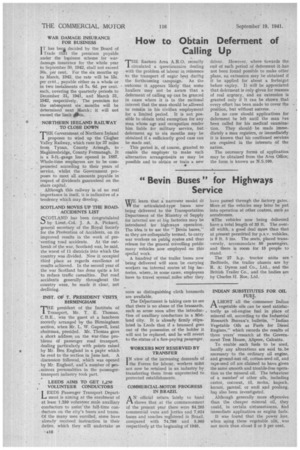WAR DAMAGE INSURANCE FOR BUSINESS
Page 18

If you've noticed an error in this article please click here to report it so we can fix it.
I T has bees decided by the Board of Trade that the premium payable under the business scheme for wardamage. insurance for the whole year to September 30, 1942, shall not exceed 30s. per cent. For the six months up to March, 1942, the rate will be 15s. per cent., payable either as a whole or in two instalments of 7s. (Id. per cent. each, covering the quarterly periods to December 31,. 1941, and March 31, 1942, respectively. The premium for the subsequent six months will be determined next March; it will not exceed the limit aen.
• NORTHERN IRELAND RAILWAY , TO CLOSE DOWN
THE Government ,of Northern Ireland proposes to wind up the Clogher Valley Railway, which runs for 37 miles from Tynan, County Armagh, to Magniresbridge, County Fermanagh. It is a 3-ft.-gauge line opened in 1887. Whole-time employees are to be compensated according to their years of service, whilst the Government proposes to meet all amounts payable in respect of dividends guaranteed on the. share capital.
Although this railway is of no real importance in itself, it is indicative of a tendency which may develop.
SCOTLAND MOVES UP THE ROADACCIDENTS LIST
SCOTLAND has been Congratulated by Lieut.-Col. J. A. A. Pickard, general secretary of the Royal Society for the Prevention of Accidents, on its improved results in the work of preventing road accidents. At the outbreak of the war, Scotland was, he said, the worst of 11. districts into which the country was divided. Now it occupied third place as regards excellence of results achieved. In the second year of the war Scotland has done quite a lot to reduce traffic casualties. But road accidents generally throughout the country were, he made it clear, not declining.
INST. OF T. PRESIDENT VISITS, BIRMINGHAM ITHE president of the Institute of 1. Transport, Mr. T. E. Thomas, C.B.E., was the guest at a luncheon recently arranged by the Birmingham section, when Mr. L. W. Gupwell, local chairman, presided. Mr. Thomas gave a short address, on the war-time problems of passenger road transport, dealing particularly with points raised a by Mr. Ben England in a paper which he read to the section. in June last. A discussion followed, which was opened by Mr. England, ancra number of pro.minent personalities in the passengertransport industry took part.
LEEDS 'AIMS TO GET 1,250 VOLUNTEER CONDUCTORS EEDS Passenger Transport Department is aiming at the enrolment of at least 1,250 volunteer male auxiliary conductors to assist the full-time conductors on the city's buses and trains. Of the many men enrolled, some have already received instruction in their duties, which they will undertake as • al8 • soon as distinguishing cloth brassards are available.
The D4partment is taking care to see that there is no abuse of the brassards, such as arose soon after the introduction of auxiliary conductors in a Midland city. It is already firmly stipulated in Leeds that if a brassard goes out of the possession of the holder it will not be replaced, and he will revert to the status of a fare-paying passenger.
WORKERS NOT RESERVED BY TRANSFER
I N view of the increasing demands of . . the Forces for labour, workers mdst not now be retained in an industry by transferring them from unprotected to protected establishments. , COMMERCIAL-MOTOR PROGRESS. IN BRAZIL
N official return lately to band shows that at the commencement of the present year there were 84,285 commercial vans and lorries and 7,024 buses and coaches registered in Brazil, compared with 74,786 and 5,965 respectively al the beginning of 1940.




















































